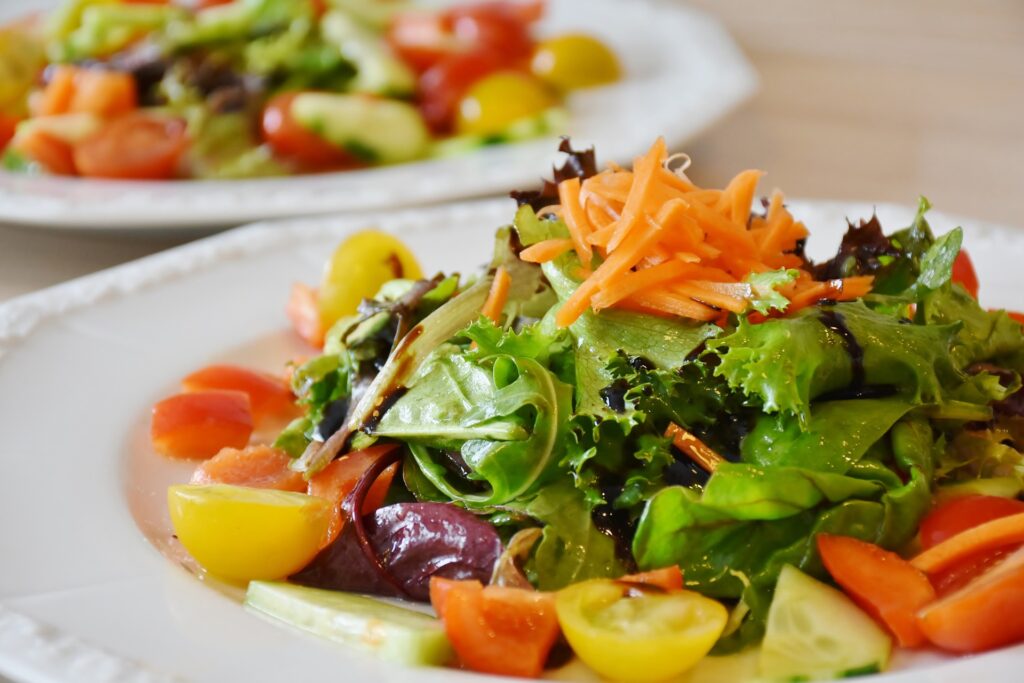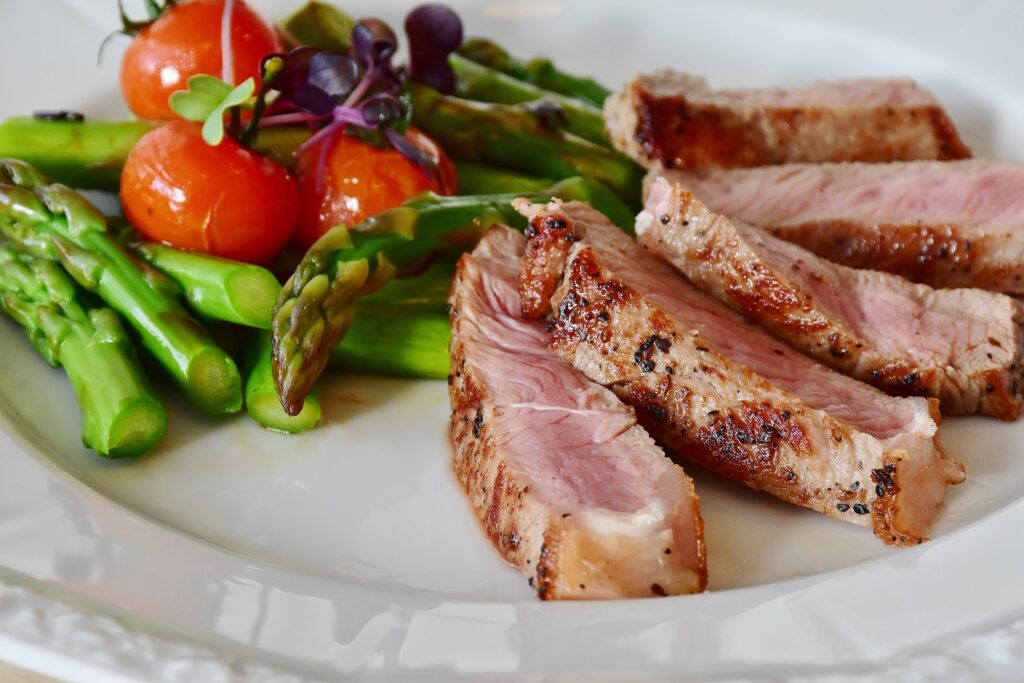Table of Contents
What is the Best Diet?
In this article, we’ll explore the fundamental principles of diet and nutrition, helping you adapt these guidelines to suit your specific needs, tastes, and goals. Even by following three of the most essential principles of a healthy diet, you can significantly improve your overall health and well-being.
Create a Goal for Your Diet
The idea of the “best diet” varies for everyone. To determine the ideal diet for you, the first step is to clearly define your goal.
For instance, if your goal is to eat the tastiest and easiest food, your approach will differ significantly from someone aiming to lose weight, build muscle, reduce inflammation, or manage a specific health condition. For some, dietary goals may even include moral or religious considerations, such as choosing veganism, halal options, or organic, grass-fed foods. Deciding if these priorities come before or after your health is important.
You can combine a few goals, but remaining realistic and honest is crucial. A common mistake is thinking, “I’ll diet for three months, lose weight, and then go back to eating what I want.” In reality, this often means prioritizing convenience and taste over long-term health.
Be Realistic and Honest
Is your goal realistic for your current age, metabolic health, and lifestyle? If you’ve tried multiple diets and haven’t succeeded, it’s time to reflect on what matters most to you: maintaining your health or choosing the easiest option.
If you prioritize ease and convenience, it’s better to acknowledge that decision than to exhaust yourself with extreme, short-term dietary changes that ultimately fail. Self-deception often leads to frustration, feelings of failure, and even depression, which can negatively impact other areas of your life.
Take an honest look at your goals. Are you truly committed to losing weight and improving your health, or are you looking for a quick way to eat whatever you desire?
Key Factors to Consider When Choosing a Diet
When selecting the best diet for your needs, consider these factors:
- General health
- Treating specific health conditions
- Overall well-being
- Weight management
- Practicality in buying, preparing, and consuming food
- Affordability
- Enjoyable and satisfying meals
- Moral or ethical considerations (e.g., vegan, religious customs, organic, non-GMO, etc.)
Most people want to balance a healthy diet with practicality and enjoyment. Prioritizing your goals in the correct order is essential:
- If you’re busy, practicality might come before enjoyment.
- On special occasions, such as family gatherings, enjoyment might outweigh other considerations.
Ultimately, your dietary choices should be sustainable, practical, and aligned with your personal values and lifestyle.

Create a Plan for Your Diet
Once you’ve defined your goals, the next step is to create a plan tailored to your needs. The key is finding the best foods for your body and developing habits you can sustain over time. This process works best when divided into two stages:
- The Goal-Achieving stage requires more discipline and focus, especially for goals such as losing weight, reducing inflammation, or managing physical or mental health conditions.
- The Maintenance Stage: Once you’ve achieved your goals, this phase is about sustaining your results with a less restrictive but still healthy approach.
Food as Medicine
Just as the wrong food can harm your health, the right nutrition can support healing. If you have a medical condition, it is highly recommended that you consult a healthcare professional or therapist to determine the best diet for your specific needs.
In my clinic, I’ve observed that while food alone can promote healing, combining proper nutrition with treatments like acupuncture, herbal medicine, and emotional support accelerates the healing process. For example:
- Digestive conditions such as IBS, Crohn’s disease, or chronic constipation can greatly benefit from acupuncture alongside a customized diet.
- For individuals dealing with pain or depression, dietary changes often feel more manageable once the primary discomfort is alleviated.
This holistic approach ensures faster and more sustainable improvements in health.
Three Simple Principles for Better Health
Before diving into specific diets, everyone should incorporate these three foundational principles for better health. Even following these basics can dramatically improve overall well-being.
The Three Most Crucial Diet Principles
Adopting these three simple principles can dramatically improve your overall health.
1. Eat Whole Foods – Avoid Processed Foods
Choose foods in their natural state. For example:
- Avocado is excellent, but packaged guacamole often contains additives.
- Oranges are nutritious, while boxed orange juice spikes glucose levels rapidly.
- Chicken is a healthy option, but processed chicken nuggets made from paste are not.
Whole foods provide your body with essential nutrients without the harmful additives commonly found in processed products.
2. Check the Ingredients
When buying packaged foods, always read the ingredients. A good rule of thumb is to avoid products with more than five ingredients, unless all are recognizable as whole foods.
- Avoid items like gravy, dressings, and soda drinks.
- Treat anything in plastic or paper boxes with caution.
In most packaged products, only one or two ingredients may offer nutritional value, while the rest serve to preserve the product or make it more addictive. By following this principle, you’ll realize that 80% of supermarkets’ so-called food is unsuitable for human consumption. Recognizing this will already put you ahead in your dietary journey.
3. Avoid Foods That Are Bad for You
Even natural foods can harm your body if they cause inflammation or disrupt digestion. While the first two principles are widely agreed upon, the third requires personal discovery. Depending on your body’s needs and sensitivities, different diets may classify certain foods as harmful.
If you’re not currently suffering from a disease, you can initially focus on the first two principles and address the third as you progress. Ignoring harmful foods for too long, however, may lead to issues like:
- Digestive diseases (e.g., IBS, Crohn’s)
- Cardiovascular, lung, or liver disorders
- Hormonal imbalances, thyroid problems, and diabetes
- General pain, arthritis, fatigue, and obesity
Here are some foods commonly regarded as harmful, listed in order of general applicability:
Foods to Avoid
1. Sugar and Wheat
- Why: These are the most common causes of inflammation.
- Examples to Limit: Bread, pastries, candies, sugared drinks, and most baked goods.
2. Seed Oils
- Why: Highly processed seed oils are linked to digestive issues and inflammation.
- Examples to Avoid: Canola oil (rapeseed oil), soybean oil, sunflower oil, corn oil, cottonseed oil, rice bran oil, grapeseed oil, safflower oil, and generic “vegetable oil.”
- Healthier Alternatives: Olive oil, avocado oil, coconut oil (for cooking), butter, ghee, and tallow.
3. Carbohydrates and Grains
- Why: These can contribute to inflammation and weight gain.
- How to Adapt: Focus on carbohydrates from fruits in moderation. For weight loss or diabetes management, reduce fruit intake. Gluten-free products can be an alternative, but they are often highly processed.
4. Dairy Products
- Why: Many people cannot digest large amounts of dairy, leading to issues like phlegm, bloating, or other sensitivities.
- Suggestions: Avoid dairy altogether or try hard-aged cheese for a few months. Organic cow or goat milk may also be easier to digest.
- Traditional Chinese Medicine Tip: If you have rhinitis or phlegm, it may indicate dairy and grains are unsuitable for you.
5. Specific Food Sensitivities
- Even if you don’t have food allergies, sensitivities can develop over time. Eating certain foods in excess can trigger inflammation and disrupt digestion.
Common examples include:
- Cruciferous vegetables: Broccoli, cauliflower, kale, and bok choy can be hard to digest, especially with thyroid issues. Cooking or steaming helps.
- Legumes: Peanuts, beans, and chickpeas can cause bloating or gas. Soaking and long cooking times can improve digestibility.
Personalizing Your Diet
The best way to identify food sensitivities is through an elimination diet. Gradually reintroduce foods after avoiding them to observe their effects. Blood tests may help, but they often only identify recent sensitivities.
Over time, and with holistic treatments like acupuncture, your digestive system can become stronger, allowing you to tolerate some previously problematic foods when consumed occasionally.

4. Personalize Your Diet
When it comes to dietary changes, everyone is different. Some people thrive with gradual adjustments, while others succeed with more drastic measures. The key is discovering what works best for you.
Educating yourself is an essential part of this journey. Read books, explore reliable online resources, watch informative videos, consult professionals, and, most importantly, learn to listen to your body.
As you delve deeper into the world of nutrition, you’ll realize there is no universal “best diet.” Even with the principles outlined earlier, people may disagree on the specifics. Ultimately, it’s your body, life, and responsibility to find the path that works for you. Remember, this is a lifelong journey, and changing your preferences as you evolve is perfectly fine.
5. What to Eat and When
Once you’ve identified what to avoid, the next step is to decide what to eat. This will largely depend on your goals. For instance, a low-carb diet is ideal for many people who want to lose weight, stabilize blood sugar levels, and reduce inflammation.
Timing is another critical factor. Consider strategies like intermittent fasting to manage when you eat and how much you consume, particularly for high-calorie foods.
Recommended Diets
Here are some popular dietary approaches, along with their benefits:
1. Meat-Based Diet
A low-carb, high-protein diet that helps reduce inflammation, supports weight loss, and promotes muscle growth.
2. Intermittent Fasting
Often paired with meat-based diets, intermittent fasting involves creating eating and fasting windows. The most common approach is 16 hours of fasting and an 8-hour eating window (e.g., eating only between 12 p.m. and 8 p.m., with no snacks).
Benefits:
- Stabilizes blood sugar levels.
- Reduces cravings and snacking.
- Supports weight management and metabolic health.
3. Keto Diet
This diet emphasizes very low carbohydrate intake, higher fat, and moderate protein consumption. Common foods include beef, chicken, eggs, nuts, and vegetables.
How It Works: The body learns to use ketones (fat) for energy instead of glucose, stabilizing energy levels, reducing cravings, and minimizing sugar swings.
4. Carnivore Diet
An extreme version of the meat-based diet, focusing on beef, organ meats, eggs, and, for some, small amounts of fruit.
Benefits:
- Reduces inflammation.
- Helps treat chronic medical conditions.
- Promotes weight loss.
5. Macro Diet
A flexible diet that balances protein, fats, and carbohydrates. It allows for a mix of foods but focuses on whole, unprocessed options and minimizes refined carbs like sugar and white flour.
Tips: Combine calorie counting with this approach to monitor your intake and meet your health goals.
6. Plant-Based Diet
Vegan or vegetarian diets are often chosen for moral, environmental, or personal health reasons. While plant-based diets can be healthy, they often involve higher carbohydrate intake.
Suggestions for Success:
- Avoid processed vegan products like commercial veggie burgers made with seed oils and GMOs. Instead, prepare homemade meals with unprocessed ingredients.
- Ensure adequate protein intake by combining rice and legumes.
- Supplement with Vitamin B12 and iron if needed, especially for women prone to anemia or those planning for pregnancy.
Tip for Flexibility: If strict veganism isn’t feasible, consider incorporating local, farm-raised eggs, which are a sustainable and highly nutritious option.
7. Chinese Medicine Diet
This therapeutic diet is based on a Chinese medicine diagnosis, aligning your food choices with your energetic imbalances.
Examples:
- For individuals with a weak spleen (often linked to gaining weight), cooked foods with warm spices like ginger and black pepper are ideal. Cold foods like milk and raw vegetables should be avoided.
- People with heat in the stomach may crave alcohol and spicy or greasy foods, but these should be limited as they exacerbate the imbalance.
This personalized approach acknowledges that cravings often lead to the wrong food choices and emphasizes balancing your diet to support your unique constitution.

6. Activity
For any weight loss plan, combining a healthy diet with regular exercise is essential. Exercise not only burns calories but also improves overall body functions, reduces stress and anxiety, and enhances mental well-being. Studies have shown that regular exercise can lower all-cause mortality by up to five times.
There are many ways to stay active, and if you’re unsure where to start, consulting a specialist can help. However, the golden rule is simple: anything is better than nothing.
A well-rounded exercise routine should ideally include a mix of:
- Long, slow cardio: Activities like walking, swimming, or cycling at a steady pace.
- Intense short-interval cardio: High-intensity interval training (HIIT) to boost cardiovascular health and burn fat.
- Strength training: Using weights or bodyweight exercises to build muscle and support metabolism.
- Flexibility exercises: Yoga or stretching to improve mobility and prevent injuries.
Be cautious of injuries. If you experience an injury, Balance Method acupuncture is highly effective in treating pain and accelerating recovery, helping you return to your exercise routine quickly.
7. Tips for Staying on Track with Your Diet
Adopting a new diet requires commitment and strategy. Here are some practical tips to help you succeed:
- Remove Temptations: Once you identify foods that don’t work for you, remove them from your home. If other household members eat these foods, store them out of sight to avoid temptation.
- Be Prepared: Always have healthy meals and snacks ready. Batch cooking and freezing meals can save time and help you stay consistent.
- Plan for Travel and Social Events: When traveling, eating out, or visiting others, bring your own food or check in advance to ensure suitable options are available.
- Cheat Meals in Moderation: If you’re following a low-carb diet and want a cheat meal, choose healthier carbs and avoid highly processed options. Be cautious, as cheat meals can reignite cravings.
- Incorporate Exercise: Combine your diet with regular physical activity to amplify results and improve overall health.
- Seek Support for Health Conditions: If you have conditions like low thyroid, IBS, constipation, or mental challenges with dieting, consider seeking additional support. Acupuncture, herbal therapy, emotional counseling, and other complementary treatments can provide significant benefits.
Final Thoughts
Ultimately, your health is your responsibility. Take the time to educate yourself, understand your body’s needs, and choose the best diet and lifestyle. Whether through exercise, a personalized diet, or holistic treatments like acupuncture, the journey to better health is within your control. Visit us at Rebalance Acupuncture Edmonton.





